Virtualization in the process teaching-learning in times of Covid-19 in the Superior Technician of Nursing
Virtualization in the process teaching-learning in times of Covid-19 in the Superior Technician of Nursing
Keywords:
process teaching-learning, digital didactic medium, virtual classroomAbstract
Introduction: The SARS-CoV-2 virus pandemic caused harm and damage globally in economic, political and socio-cultural spheres, however, Information and Communication Technologies (ICT) have become a powerful tool to achieve significant learning in university students. Materials and methods: Theoretical methods were used: system approach, historical-logical and analysis-synthesis; as well as empirical: documentary analysis and the criteria of specialists. Results: It was obtained as a result that at the end of the 2020 course, 100 % of students passed with grades between 4 and 5. It is concluded that the study guides promote deepening, link with the disciplines and subjects of the Higher Technician Nursing career, as well as achievements in learning and the leading participation of students. Discussion: The practical significance is verified in the social sense and is given by the positive impact that is achieved with the revitalization of the training in the training process of the Higher Technician of Short Cycle in Nursing, as a way that favors quality in integrality of these and thus communicate and educate the population, managing to improve the quality of life of people and the quality of the services provided. Conclusions: It is concluded that the study guides promote the deepening, link with the disciplines and subjects of the Higher Technical Nursing career, as well as achievements in learning and the leading participation of the students. Likewise, through the virtual classroom, the progressive development in student learning was evidenced, aimed at improving communication and independent work, serving as an auxiliary means for improving the quality of the teaching-learning process, and the achievement of results satisfactory.
References
Aguilera Cuevas, S. M. et al. (2007). La Universidad como gestora del conocimiento en la formación del Capital Humano. Universidad de Oriente. http://www.gecyt.cu/redcapitalhumano/ ponencias/p_16a.pdf
Alarcón, R. (2008). La nueva Universidad Cubana. Revista Pedagogía Universitaria. https://revistas.mes.edu.cu/greenstone/collect/repo/import/repo
Badía A. y Burbera, E. (2004). Educar con aulas virtuales: Orientación para la innovación en el proceso de enseñanza y aprendizaje. (s.e.).
Barreda, L., Peralta Benítez, H. y González, A. (2009). Sistema de procedimientos didácticos para la dinámica del proceso de formación científica en la enfermería. Revista Pedagogía Universitaria, XIV(2). http://revistas.mes.edu.cu/Pedagogia-Universitaria/articulos
Burbera, E. y Badía, A. (2005). El uso educativo de las aulas virtuales emergentes en la educación superior. (s.e.).
Damiani Cavero, J. S., et al. (2015). Morfofisiología I. Ecimed.
Espinoza Troconi, M., Cintra Lugones, A. L., Pérez Martínez, L. de la C., León Robaina, R. (2016). El proceso de formación científica e investigativa en estudiantes de la carrera de odontología: una mirada desde el contexto venezolano. http://scielo.sld.cu/scielo.php?script=sci_arttext&pid=S1029-30192016000600013&lng=es
García, L. (2002). La educación a distancia: De la teoría a la práctica. (s.e.).
Machado Cano, M. J., Morgado Bonachea, I. & Alegrant Padrón, M. L. (2009). Producción científica sobre salud de la provincia Ciego de Ávila entre los años 2003 y 2007. ACIMED. http://scielo.sld.cu/scielo.php?script=sci_arttext&pid=S1024-94352009000300004.
Rosales Reyes, S. A. & Valverde Grandal, O. (2008). La formación para la investigación en el perfil de carreras de estomatología de universidades latinoamericanas. http://scielo.sld.cu/scielo.php?script=sci_arttext&pid=S0034-75072008000300007&lng=es
Rosario, J. (2007). Las aulas virtuales como modelo de gestión del conocimiento. (s.e.).
Rosell Puig, W., Dovale Borjas, C. y Alvarez Torres, I. (2007). Morfología Humana I. Ecimed.
Downloads
Published
How to Cite
Issue
Section
License
Copyright (c) 2023 Madelín Marcel Fabré, Bárbara Yeniseys Izquierdo Lahera, Bismarys Lescaille Riveri

This work is licensed under a Creative Commons Attribution-NonCommercial-NoDerivatives 4.0 International License.
This journal provides immediate open access to its content, based on the principle that offering the public free access to research helps a greater global exchange of knowledge. Each author is responsible for the content of each of their articles.



























 Universidad de Oriente
Universidad de Oriente 